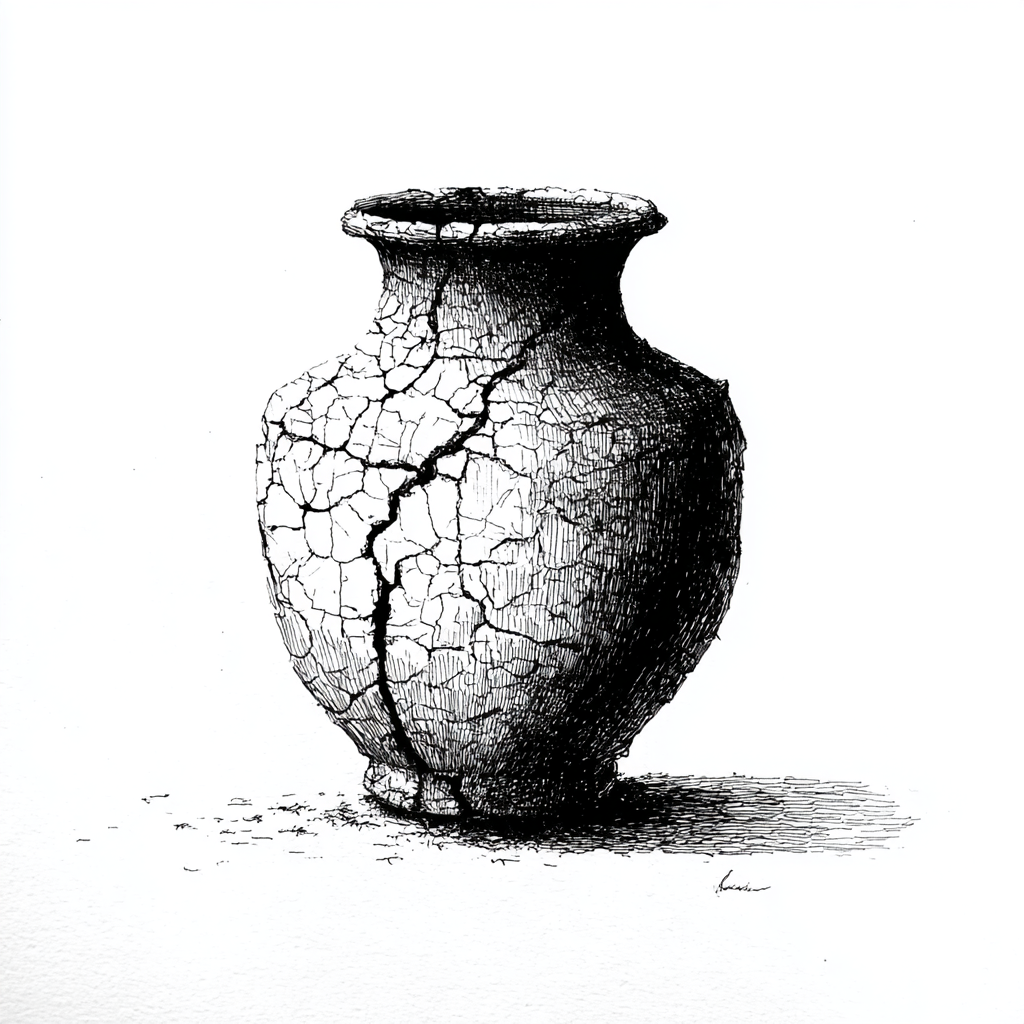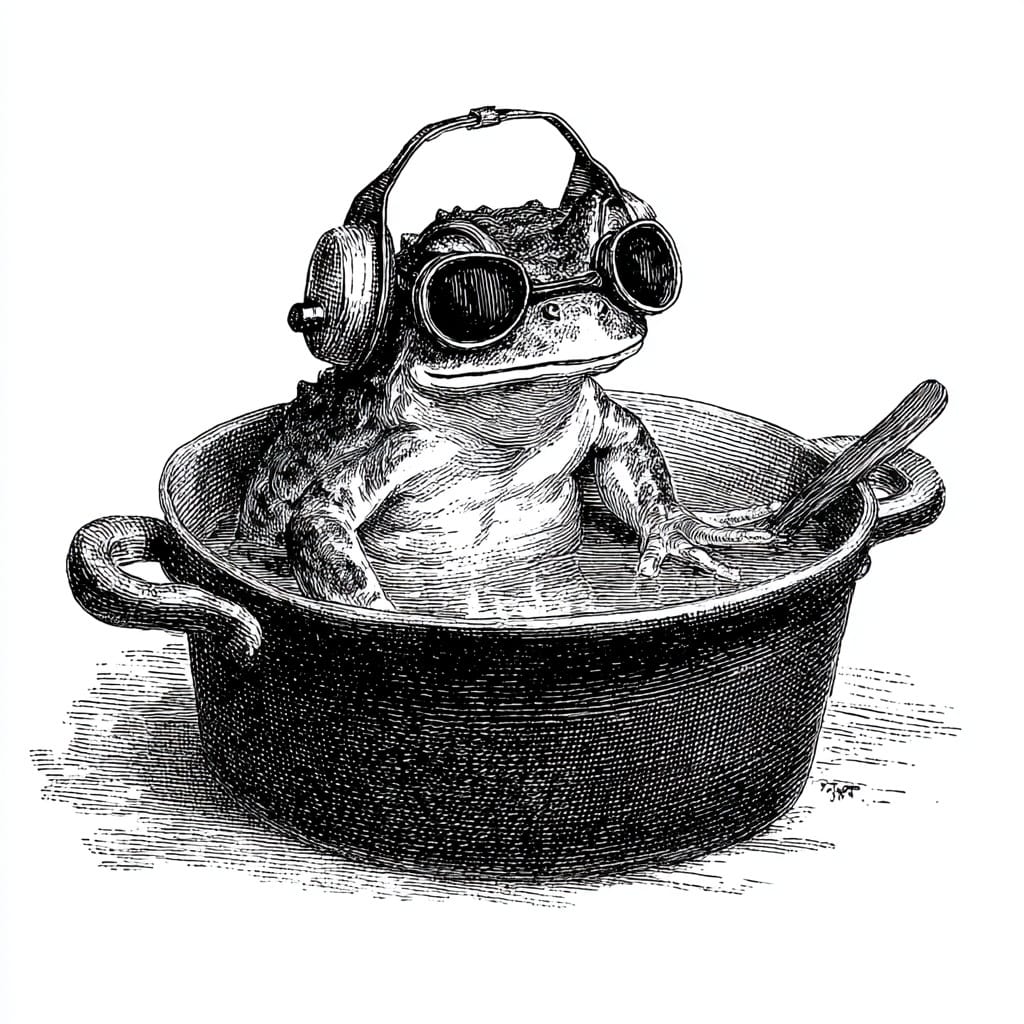As the Cracks Appear

Who is The Athanor for?
It seems so unfair when we have to let go of something we have worked really hard for. Sometimes, it's a decision we make for ourselves. Sometimes, it's a decision made for us. I've experienced both several times.
There's a pattern. We think we've succeeded. We have built career capital through many years of hard work. We have gained a degree of professional autonomy. We have become good, excellent even, within the boundaries of our company and sector.
We have reached a point where income exceeds expenditure, and we are beginning to relax a little. And now we find ourselves standing at the edge of something we didn't anticipate. A second or third journey that requires unlearning what our previous journeys taught us.
This isn't about failure. This is about discovering that success itself has been decontextualised.
The Displacement We're Sensing
There's a rule in technology circles. Mollick's Law: the AI we have today is the worst AI we'll ever have.
Every version from here forward will be more capable, faster, cheaper, and more integrated. If we're paying attention, we know what this means. The skills we spent years mastering, the ones that made us valuable, that gave us status and security and professional identity, are being automated.
Not in some distant future. Now. With machinery that improves daily. We're not talking about routine tasks. We're talking about sophisticated work. The skills that we thought accreditation and professional bodies would protect. Pattern recognition in complex data, work that requires judgment, experience, and leadership.
For decades, we've been training people to be good at data. Systems. Processes. Optimisation. Lean Six Sigma, Agile. The entire apparatus of modern professional work has been organised around exactly what silicon now does better than biology.
We have become complacent. Companies and structures that are so big that they cannot keep up and make themselves vulnerable due to their scale. As I'm writing this, I'm wondering when you will get it, as AWS has gone down. (ChatGPT suggest it supports around 34% of top web applications)
And our organisations haven't caught up yet. They're still hiring for data competence. Crossing their fingers and hoping. Still hiring people with skills that are becoming obsolete, even as they apply pressure to integrate the technologies that may well replace them.
It creates a specific kind of vertigo. Not the panic of job loss, but something harder to name. The recognition that what we have mastered may no longer matter in the way we thought it did.
What Remains When the Machine Perfects the Measurable?
When the skills we have trained for become externalised, when every calculable act from diagnosis to design becomes available on demand, perfected by machinery, what remains for us?
The honest answer requires subtraction. Via Negativa. Define ourselves not by what we do today, but by what we can do that cannot be done by data.
AI does not inhabit a body. It doesn't carry weight, feel fatigue, or age. We think through our bodies; we are creatures with many ways of knowing, in a constant search for meaning. Without mortality, there's no measure of value, no reason to treasure a moment.
Meaning comes from endings and beginnings. We linger between options, sometimes painfully, and from that uncertainty, meaning is born. Creation begins in the gap between knowing and unknowing. The sudden, fragile leap of intuition. Courage.
AI cannot step into the unknown. Its knowledge is constrained by the known; it has no motive power, curiosity or innate purpose.
The Middle Passage
James Hollis calls it The Middle Passage. We enter the world of work with a provisional personality, the one that we've developed during our period of education and early work, shaped by the expectations of others.
At some point, it strikes us that what we hoped would happen hasn't happened. We look at our lives stretching into the future, and we're not that happy about where we find ourselves.
In previous times, we might have called it a midlife crisis. but our lives were slower then.
Today, that realisation is likely to happen several times during our working lives (which will themselves probably be longer). We would like things to normalise; for what is happening to be a period of madness from which we will recover and can get on with our lives. We also know it won't. We can't just walk away.
We're standing in the thick of life. Families, mortgages, school fees, ageing parents (or for some of us, being that ageing parent), commitments that cannot be abandoned or deferred. We have responsibilities that require income, and what is happening makes that feel insecure, whether we are employed, self-employed or retired. Today, retirement is no sanctuary.
This is the predicament we face: transformation under constraint. Change while carrying weight. Becoming different without the luxury of starting fresh. Conventional narratives don't help. "Follow our passion" assumes freedom to take risks. "Reinvent ourselves" assumes we can afford to be a beginner again. "Retraining" assumes the problem is skills acquisition, when the actual problem is that the entire logic of value has shifted. AI is reshaping systems, not tinkering with jobs.
One of my favourite blogs is Ewan McIntosh's "Provocation". This was part of it today:
"When the pipers fell silent, Julie Beels thought her career might be over. It was February 2008 at Murrayfield, and the stadium was full for the Six Nations match between Scotland and France. 67,500 fans, the Scottish team lined up, the air electric. Julie, a 21-year-old freelancer at the time, had made what felt like a catastrophic mistake. In rehearsal, she’d told the pipe band to play the national anthem only once, in order to speed up rehearsals. Of course, they’d need to play two verses on match day. Of course they would. So when the pipes and drums stopped halfway through Flower of Scotland, the silence hit her like a punch in the stomach.For a split second, the crowd hesitated.And then, something extraordinary happened.They sang. Unaccompanied. A capella. Loud and proud.That “mistake” became one of the most iconic moments in Scottish Rugby’s history, the moment the crowd became the anthem. It’s now tradition. Goosebumps guaranteed. In Scotland, when things go wrong, we say “keep the heid”:Don’t panic. Don’t rush to fix. Don’t let fear take the wheel."
The thing is, we don't need to be told what to do, and we already have everything we need to move forward. We just need the space, the sanctuary, and the silence to work it out. We just need to "keep the heid"
That's why The Athanor exists.
There are different ways to look at it. I've always liked the metaphor of alchemy. Adam Morgan and Mark Barden talk about A Beautiful Constraint. The reality is that what is happening will change everything. Just not in the way that we expect. It will throw up as many opportunities as challenges, and whilst we may be equipped for it, we have not trained for it. We will find ourselves improvising, experimenting, and breaking new ground.So this is not a space for people who want to be told what to do or for those who want to tell other people what they should do. There are already a number of ideas, and there will be many more yet.
The Invitation
We already possess what we need. The question is whether we're ready to let it transform. The next journey doesn't begin with ambition. It begins with recognition; that success is insufficient and that mastery can be decontextualised.
That the ground is shifting and we must move with it, through dissolution, releasing measures and values that no longer serve. Sitting with uncertainty, and recovering the capacities we had before the world trained them out of us. And it resolves not in triumph but in coherence. Work aligned with values. Contribution measured by what resists data. A life built on sufficiency rather than extraction.
If you recognise yourself in this—if you're standing at the end of one journey and the beginning of the next, the invitation is simple. You don't have to do it alone.

Comments ()